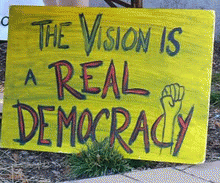Nine US Senators, led by Tom Udall of New Mexico, have introduced a joint resolution (Senate Joint Resolution 29, or SJRes 29) calling for a constitutional amendment to limit money in elections. It's presented as an effort to "Reverse Citizens United ," the 2010 Supreme Court decision expanding the never-intended constitutional free speech "rights" of corporations to spend money from their treasuries to influence elections -- without having to report it.
The recent explosion of corporate election spending and projected meteoric increase next year is likely major motives for this resolution. Another one is, no doubt, the rising chorus heard in the Occupation Movement that "corporations are not persons " -- short hand for a call to abolish corporate constitutional rights via a constitutional amendment.
Albert Einstein once observed, "If I had an hour to solve a problem and my life depended on the solution, I would spend the first 55 minutes determining the proper question to ask, for once I know the proper question, I would solve the problem in less than five minutes."
Senator Udall and his resolution co-sponsors rushed to a solution without correctly determining the proper question.
It doesn't take 55 minutes -- or Einstein for that matter -- to figure out that our entire political system is and has for a very long time been fixed -- rigged toward the interests of wealthy individuals and corporations.
It basically doesn't matter:
- How smartly we study and then prepare a glossy report on the dangers of the activities of (fill in the name of any major corporation here),
- What animal we dress up as outside a corporate headquarters to protest an environmental destruction,
- How many constituents we bring to testify (to put a human face on the problem) on the impact of a particular corporate abuse to their communities before a regulatory agency,
- What experts we hire to document that a tax cut to the super rich or corporations harms the economy and balloons the public debt,
- What lawyers we hire to make the case that corporations shouldn't be able to hide behind 14th Amendment "equal protections" or the Commerce Clause to site their big box store or dump their toxic trash in our communities,
- The number of call-in days, letter writing campaigns or email blasts we organize to pressure public officials,
- Or even (I know this in the minds of many is scandalous) whom we elect of whatever political party to public office.
The bottom line almost without exception -- whether it's today, the day after the Citizens United ruling, or the day before the decision -- is that if the super wealthy and corporations will be seriously harmed by whatever bill, law, regulation, rule or decision the public wants, it won't happen -- short of massive grassroots organizing, sometimes over many months or years. If something is passed or decided, it's been so stripped down in depth, breadth or enforcement (i.e. the federal Dodd-Frank financial so-called "reform" bill is one classic example) that it's one half step above complete uselessness. Actually, such half-baked measures are worse than useless as they are proclaimed by proponents (from politicians to pundits) as real reform!
Our political system is fundamentally broken. On an unconscious if not conscious level, a majority of participants of both the Tea Party and Occupation movements know this.
Real democracy doesn't exist. It's a problem what goes back to when wealth and corporations first attained rights and disproportionate power -- which is basically at the beginning of our nation in the case of the former and more than a century ago in the later.
The root question Einstein might produce if he pondered this problem is: "Can we have anything approaching a real representative democracy in a society that defines money as speech and corporations as people with inalienable constitutional rights?"
If our answer is NO, then SJRes29 doesn't come remotely close to being a solution. Despite websites popping up with mastheads saying "REVERSE CITIZENS UNITED" and asking people to sign a petition calling for a "constitutional amendment to give Congress and states the authority to limit corporate and special interest money in our elections," the whole effort is inadequate.
The two sections of the proposed amendment states, "Congress shall have power to regulate the raising and spending of money and in kind equivalents with respect to Federal elections-- and "A State shall have power to regulate the raising and spending of money and in kind equivalents with respect to State elections."
Shall?
(Note: You can view every article as one long page if you sign up as an Advocate Member, or higher).






